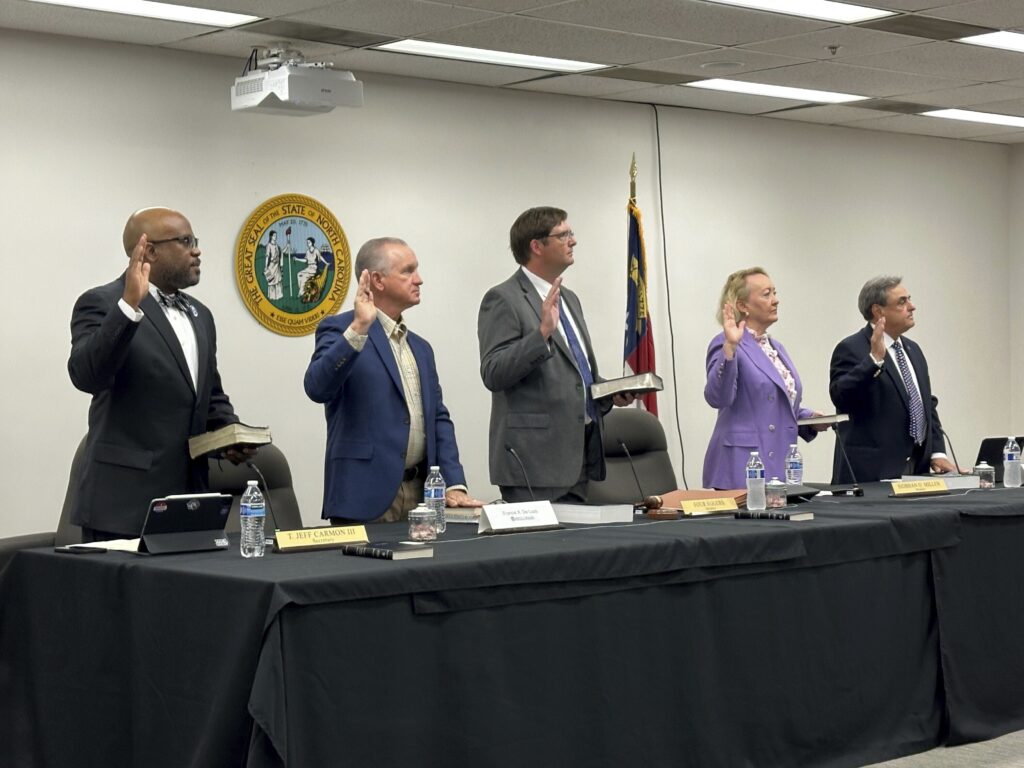Around 98,000 Voters Risk Disenfranchisement Under New North Carolina Plan

Nearly 100,000 North Carolina voters will be required to take an additional step to verify their identity or risk being disenfranchised under a plan approved by the GOP-controlled state board of elections Tuesday.
The board announced the plan in response to a lawsuit filed last month by the U.S. Department of Justice (DOJ), alleging that North Carolina had failed to collect information from voters required by federal law.
“I’ve said from day one that I am committed to bringing North Carolina into compliance with the law,” said Sam Hayes, executive director of the State Board of Elections in a statement. “We are making this process as simple and straightforward as possible for the affected voter.”
The board’s plan would go into effect if DOJ approves. Hayes said Tuesday the agency has tentatively signed off but is waiting to see the details.
At the center of the dispute is the voter registration form created by the state board. The DOJ lawsuit notes that while the board asked applicants to provide proof of identification – a driver license number, DMV number or part of a Social Security number – it did not indicate that the information was required. As a result, the ID information is missing for around 200,000 registered voters, according to the board. The DOJ claims the board failed to maintain accurate voter lists in violation of the Help America Vote Act (HAVA).
Under the board’s plan, the state will mail two notices to each affected voter requesting the missing information, Hayes said Tuesday at a public board meeting.
For around 98,000 of that group, they will need to respond to the mailings or else be forced to cast a provisional ballot.
“If that person were to appear back at the polls to cast a ballot, they would be flagged in the system, in the pollbooks, which would alert the poll workers that they must collect that information,” Hayes said.
The other roughly 97,000 affected voters will still be able to cast a regular ballot, because although they didn’t initially provide a driver license or Social Security number, they have subsequently shown an alternative form of ID, as allowed under HAVA.
Democrats argued voters shouldn’t bear the burden of fixing the government’s mistake.
“I find it hard to require citizens to do something extra…to say now because a state board made a mistake, we’re depending on you to fix it,” Jeff Carmon, one of two Democrats on the board, said at the meeting.
Carmon said forcing voters to take the additional step is not only burdensome but unnecessary given the lack of evidence of voter fraud in North Carolina.
The new plan is the latest hurdle for a group of North Carolina voters who already had their voting rights challenged in court. Republican Judge Jefferson Griffin sought to throw out thousands of ballots in an effort to overturn the election he lost last year to Democratic Justice Allison Riggs. A federal court ruled against Griffin and he conceded the race.
But the lawsuit filed by the Department of Justice appears aimed at achieving a similar result.
The GOP took control of the state’s board of elections thanks to a law passed last year which stripped the governor, a Democrat, of the right to appoint board members and handed it to the state auditor, a Republican. The new board chair, Francis X. De Luca, led the conservative Civitas Institute group when it challenged the results of North Carolina’s 2016 gubernatorial election.
The new board appointed Hayes, a former top lawyer for the North Carolina Speaker of the House, a Republican, as executive director last month. He replaced Karen Brinson Bell, a respected nonpartisan election administrator.
With the board unwilling to vigorously defend voting access in response to the DOJ’s lawsuit, multiple groups have filed motions to intervene as defendants, including the North Carolina Alliance for Retired Americans, the League of Women Voters of North Carolina, the Democratic National Committee and the NAACP North Carolina State Conference.
In a court filing, the North Carolina Alliance for Retired Americans argued it has the right to intervene because its members could be disenfranchised by the lawsuit and are not adequately represented by the defendants in the case.
“Given recent changes in the composition and leadership of the North Carolina State Board of Elections, there is no assurance that Defendants will fully protect them,” the filing said. “Indeed, there is substantial reason to believe the State Board may agree with the federal government in this case.”
Proposed Intervenor the North Carolina Alliance for Retired Americans is represented by the Elias Law Group (ELG). ELG Firm Chair Marc Elias is the founder of Democracy Docket.